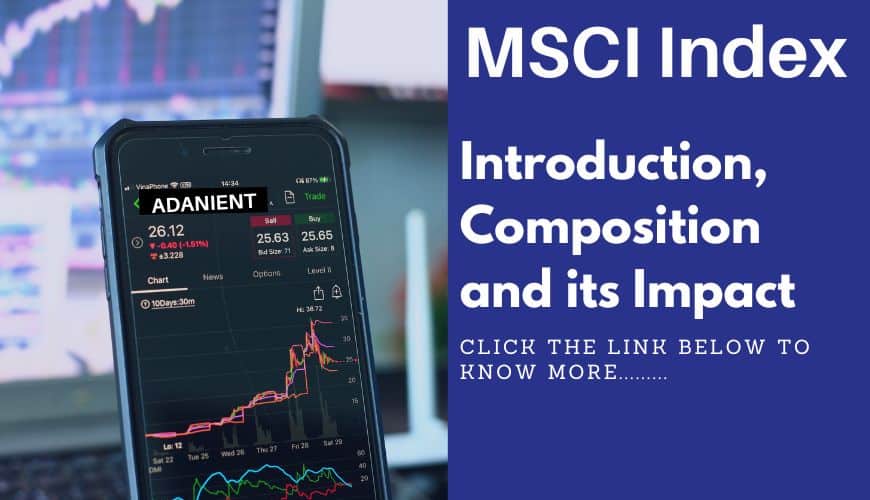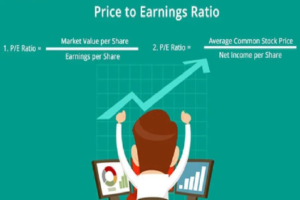
MSCI Index – Introduction, Composition, and Impact
- Categories Finance
- Date July 8, 2023
News Update: 16th Feb 2023:
MSCI Index delays the cut in weightage for Adani Total Gas and Adani Transmission to May’23 Review.
When it All Started
Post Hindenburg’s report on Adani Group companies , meltdown of all group companies share price started and on
8th of Feb’23, Morgan Stanley Capital International (MSCI) announced that they will decrease the weightage of Adani Group companies from their portfolio Index
Adani Group Companies in Index
The Adani group companies included in MSCI Index include Adani Enterprise, Adani Transmission, Adani Total Gas, Adani Green, Adani Transmission, Adani Power, Adani Ports and ACC Cement. Adani Group entities Adani Wilmer and NDTV are not part of the Index. Out of the Index companies of Adani group, 4 companies Adani Enterprises, Adani Transmission, Adani Total and ACC came under the MSCI rebalancing after the Hindenburg’s report.
The MSCI as announced earlier, will be rebalancing the weight of Adani Enterprise and ACC, from March 1st, 2023, but the group companies Adani Total Gas and Adani Transmissions rebalancing is put on hold till May’23 review. MSCI Index have transited to Quarterly Comprehensive Index Review (QCIR) from February’23.
Impact Share Price – Adani Group Companies
Having seen the impact let’s now dive deep into understanding the MSCI Index.
This article will help reads understand MSCI Index, its composition, History and Impact of rebalancing on the stocks included in the Index.
About MSCI and It’s Indices
Morgan Stanley Capital International Inc. (NYSE: MSCI), a leading provider of critical decision support tools and services for the global investment community. MSCI is a leading provider of critical decision support tools and services for the global investment community.
Company has over 50 years of expertise in research, data, and technology, and enable clients to understand and analyze key drivers of risk and return and confidently build more effective portfolios. As per company, Clients use their industry-leading, research-enhanced solutions to gain insight into and improve transparency across the investment process.
The MSCI Index, created by Morgan Stanley in 1963 and formerly known as Morgan Stanley Capital International Index, is one of the most widely recognized and respected stock market indices in the world. The index is used by investors and fund managers to track the performance of equity markets globally, and it has become a benchmark for investment managers seeking to allocate capital to international markets.
Composition of the MSCI Index
MSCI Global Investable Market Indexes are constructed and maintained with the objective of reflecting the evolution of the world’s equity markets and segments on a timely basis, while remaining replicable and stable.
Let’s now Understand the Major Index for MSCI- MSCI’s ACWI Index
MSCI’s ACWI Index, which captures large- and mid-cap returns across 47 developed and emerging markets, comprises 2,895 constituents (as of June 30, 2022) and is the industry’s accepted gauge of global stock market activity. The index is built using MSCI’s Global Investable Market Index (GIMI) methodology, which is designed to take into account variations reflecting conditions across regions, market cap sizes, sectors, style segments and combinations.
The index is updated quarterly, with changes made to reflect the evolution of the markets and the economy.
Source: https://msci.com
List of Companies in the MSCI Index
The MSCI Index’s includes a broad range of companies from a variety of industries, including technology, healthcare, financials, and consumer goods. Some of the largest companies in the MSCI Index include Apple, Microsoft, Amazon, and Facebook. These companies, along with others such as Alphabet (Google), JPMorgan Chase, and Johnson & Johnson, make up a significant portion of the index.
Weightage of Companies in the MSCI Index
The weight of each company in the MSCI Index is determined by its market capitalization. The larger the market capitalization of a company, the greater its weight in the index. As of February 2023, the top five companies in the MSCI Index by weight are Apple (5.3%), Microsoft (5.2%), Amazon (3.3%), Facebook (2.1%), and Alphabet (1.8%).
Indian Companies in the MSCI Index
India has a significant presence in the MSCI Index, with several Indian companies included in the index. As of February 2023, the Indian companies in the MSCI Index with their weightage are as follows:
- HDFC Bank (0.82%)
- Reliance Industries (0.71%)
- Infosys (0.59%)
- Tata Consultancy Services (0.49%)
- Housing Development Finance Corporation (0.35%)
Why Should we look at the MSCI Index?
MSCI is a global leader in Equity Indexes. As per 31st Dec 2022, $13.5 Trillion assets in management were benchmarked to MSCI Indexes and company calculates more than 2,69,000 Index daily with 15000+ Index calculated in real time. 1300+ ETF are benchmarked to MSCI Indexes.
Impact of Exclusion from the MSCI Index
For companies that are excluded from the MSCI Index, the impact on their share price can be significant. As a part of MSCI Index means that a company is among the largest and most influential in its market, and exclusion from the index can be seen as a negative signal to investors.
When a company is excluded from the MSCI Index, it may experience a decline in demand for its shares from index funds and other investors that track the index. This can lead to a decline in the company’s share price and a decrease in its market capitalization.
We have seen the same in case of Adani group companies, combined with other market factors, led to sharp decline in company’s stock prices. The exclusion of four companies could lead to an approximate outflow of $1.5 billion as Fund Houses follow the MSCI benchmark, as they will have to rebalance their portfolio, leading to selling pressure on the Adani Group Companies.
In all the MSCI Index is an important tool for investors seeking the performance of equity markets globally and Portfolio Managers using the index as a Benchmark. As the Index represents a broad market from developed to developing and emerging markets, it provides a comprehensive view on the global economy and is widely recognized as an Index for Benchmarking by Portfolio managers.
Happy Learning!
You may also like

August Auto Sale Report





